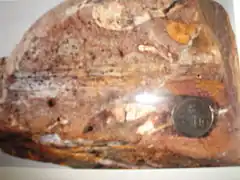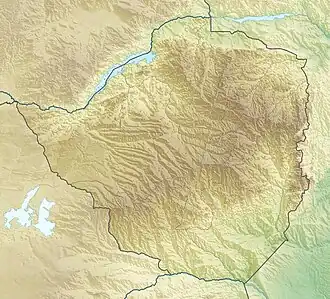| Angwa Sandstone | |
|---|---|
| Stratigraphic range: Triassic ~ | |
 | |
| Type | Geological formation |
| Unit of | Upper Karoo Group, Karoo Supergroup |
| Sub-units | Alternations Mb. Chirambakadoma Mb. |
| Underlies | Pebbly Arkose Formation |
| Overlies | Lower Karoo Group |
| Lithology | |
| Primary | Sandstone |
| Other | Siltstone |
| Location | |
| Coordinates | 16°06′25″S 30°18′25″E / 16.107°S 30.307°E[1] |
| Country | |
| Type section | |
| Named for | Angwa River, Zimbabwe |
| Named by | P.M. Oesterlen, Zimbabwe Geological Survey[2] |
 Angwa Sandstone (Zimbabwe) | |
The Angwa Sandstone is a geological formation of the mid-Triassic, consisting mainly of sandstone.[3]
Geology
The formation is a sedimentary unit, consisting mainly of fluvial sands and silts.[1]
It has been dated as covering rocks from much of the Triassic, with pollen and flora identified from the Induan, and Ladinian to Norian.[4][5]
Stratigraphy
The Angwa Sandstone is the lowest formation in the Upper Karoo Group of the Karoo Supergroup, underlying the Pebbly Arkose Formation and overlying the Lower Karoo Group.[6] The formation is divided into two members: the Alternations Member and the Massive Sandstone (Chirambakadoma) Member.[1]
The Angwa Sandstone has been correlated to the Molteno Formation of the Great Karoo Basin, South Africa,[4][1] and to the Escarpment Grit of the Mid-Zambezi Basin.[7]
Occurrence
The Angwa Sandstone Formation is found in Mozambique, Zambia, Zimbabwe, in the Mana Pools and Cabora Bassa Basins.
Flora
| Pinales of the Angwa Sandstone | ||||
|---|---|---|---|---|
| Genus | Presence | Notes | Images | |
| Dadoxylon | Mbire District and Chirundu, Zimbabwe | |||
| Callistophytaceae (Pteridospermopsida) of the Angwa Sandstone | ||||
|---|---|---|---|---|
| Genus | Presence | Notes | Images | |
| Lepidopteris | Manyima River, Mbire District, Zimbabwe | |||
| Dicroidium | Manyima River, Mbire District, Zimbabwe | |||
| Ginkgoales of the Angwa Sandstone | ||||
|---|---|---|---|---|
| Genus | Presence | Notes | Images | |
| Sphenobaiera | Manyima River, Mbire District, Zimbabwe | |||
References
- 1 2 3 4 P. M. Oesterlen; B. D. Millsteed (1994). "Lithostratigraphy, palaeontology, and sedimentary environments of the western Cabora Bassa Basin, lower Zambezi Valley, Zimbabwe". South African Journal of Geology. 97: 205–224.
- 1 2 P.M. Oesterlen (1990). "The geology of the Dande West area (western Cabora Bassa Basin) - a preliminary report". Annals of the Zimbabwe Geological Survey. 14: 12–20.
- ↑ Moore, A.E.; Cotterill, F.P.D.; Broderick, T.; Plowes, D. (2009). "Landscape evolution in Zimbabwe from the Permian to present, with implications for kimberlite prospecting". South African Journal of Geology. 112: 65–88. doi:10.2113/gssajg.112.1.65.
- 1 2 d'Engelbronner, E.R. (1996). "New palynological data from Karoo sediments, Mana Pools basin, northern Zimbabwe". Journal of African Earth Sciences. 23 (1): 17–30. Bibcode:1996JAfES..23...17D. doi:10.1016/S0899-5362(96)00049-8.
- 1 2 3 4 G. Barale; M. Bamford; B. Gómez; T.J. Broderick; M.A. Raath; A. Cadman (2005). "A fossil peat deposit from the Late Triassic (Carnian) of Zimbabwe with preserved cuticle of Pteridospermopsida and Ginkgoales, and its geological setting". Palaeontologia Africana. 41: 89–100.
- ↑ Oesterlen, P.M.; Blenkinsop, T.G. (1994). "Extension directions and strain near the failed triple junction of the Zambezi and Luangwa Rift zones, southern Africa". Journal of African Earth Sciences. 18 (2): 175. Bibcode:1994JAfES..18..175O. doi:10.1016/0899-5362(94)90029-9.
- ↑ Catuneanu, O.; Wopfner, H.; Eriksson, P.G.; Cairncross, B.; Rubidge, B.S.; Smith, R.M.H.; Hancox, P.J. (2005). "The Karoo basins of south-central Africa". Journal of African Earth Sciences. 43 (1–3): 211–253. Bibcode:2005JAfES..43..211C. doi:10.1016/j.jafrearsci.2005.07.007.
- ↑ D. Love (1997). "The geology of the Chirundu area, Zambezi Valley". Annals of the Zimbabwe Geological Survey. 18: 18–26.